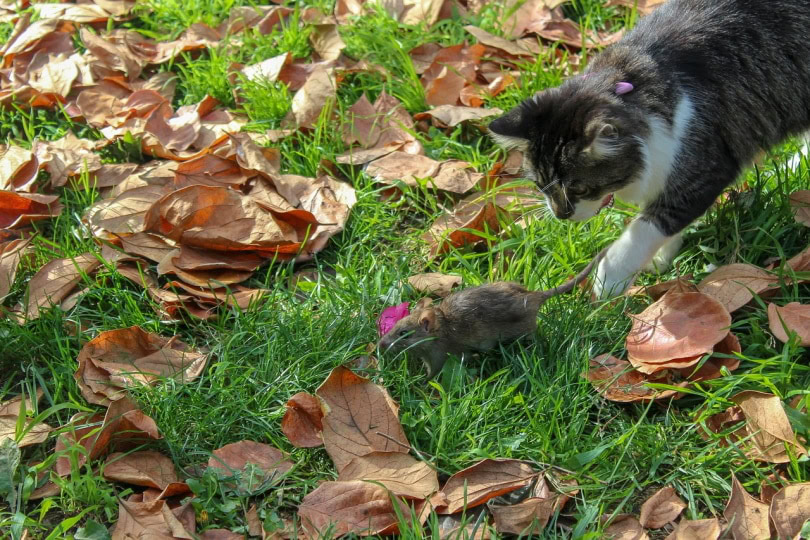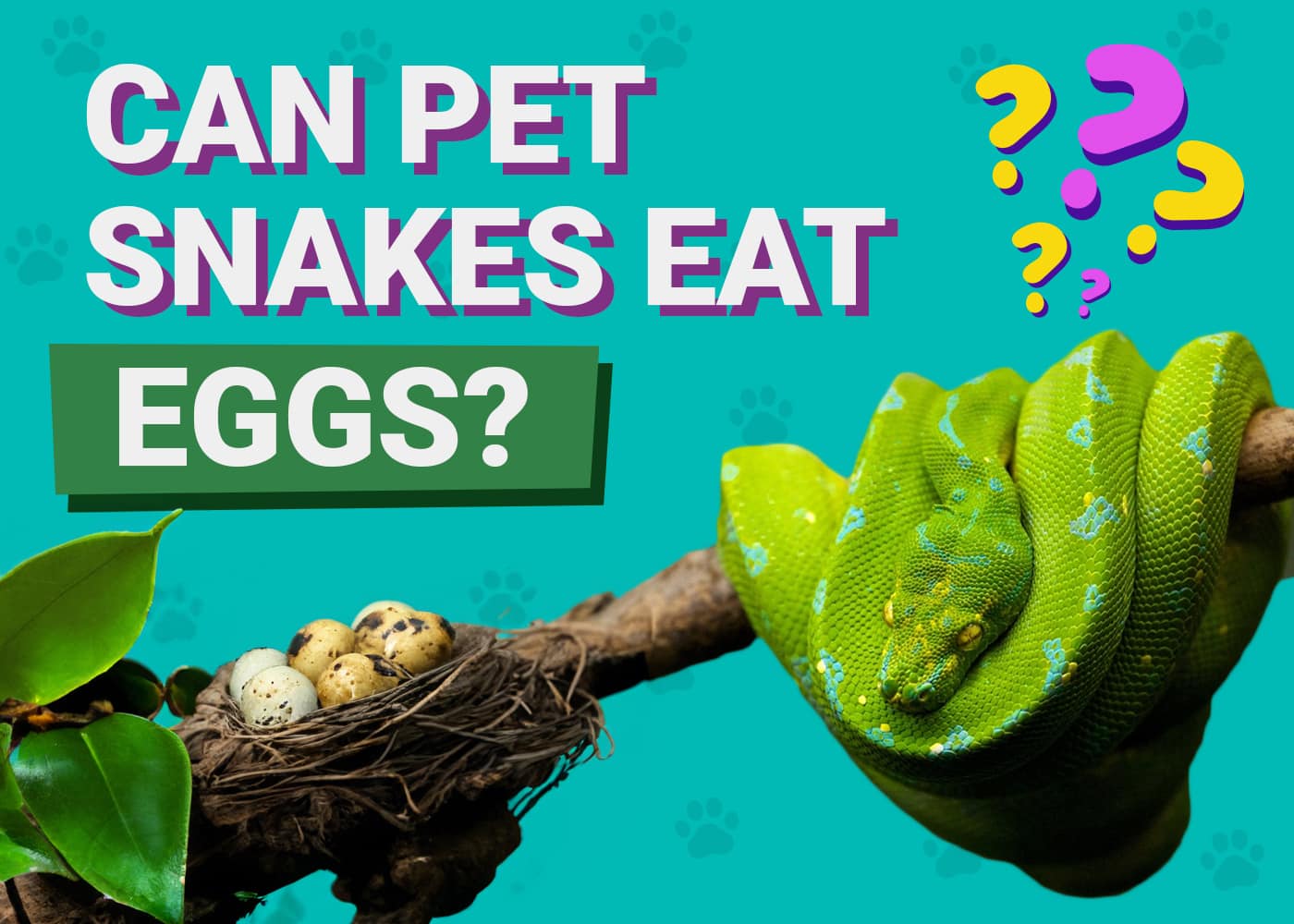VET APPROVED

The information is current and up-to-date in accordance with the latest veterinarian research.
Learn more »Click to Skip Ahead
We’ve seen it in movies and cartoons: a cat chasing a mouse in the hopes of a light dinner. But if you’ve never lived in a place with mice and your cat is indoors only, this is probably a question that you might have if you’ve never witnessed it firsthand. Do cats eat mice?
They absolutely do. In reality, it isn’t so funny, but cats are hunters, and mice are definitely part of a cat’s diet, particularly in the wild.
In this article, we look at why cats seem to enjoy eating mice and whether you should be worried if your cat does eat one. We also look at ways of trying to reduce your cat’s hunting if it’s become a problem.

How Cats Hunt
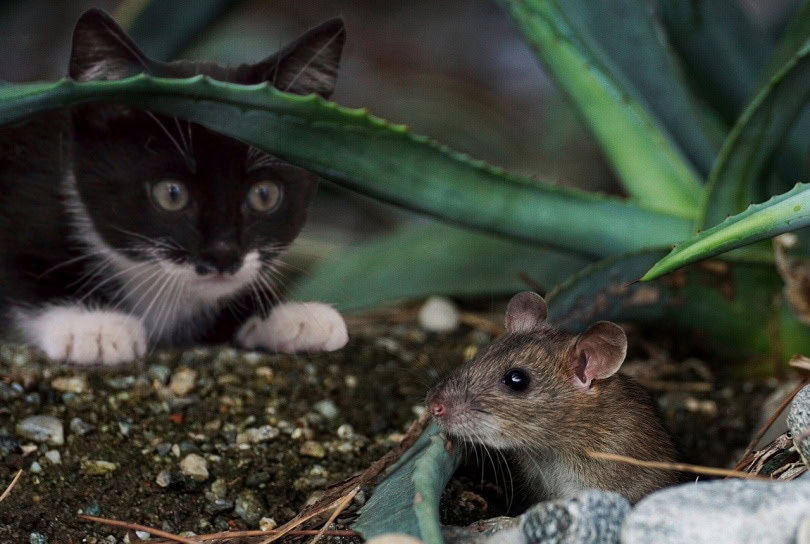
It’s in a cat’s nature to hunt, particularly small prey. We’ve all seen it — even if it hasn’t been with an actual animal, it’s in their play. Cats spend a great deal of time chasing, stalking, pouncing, and chomping down on toys (and sometimes our hands).
Cats use two methods when hunting. One is active and the other involves patience and stillness. Cats spend most of their time lying in wait, fairly motionless, for extended periods outside of their prey’s habitat or hiding place. But they also are capable of using fast spurts of energy to chase their prey. It might start with stalking (or lying in wait) and end with running and pouncing and possibly catching.

Why Do Cats Eat Mice?
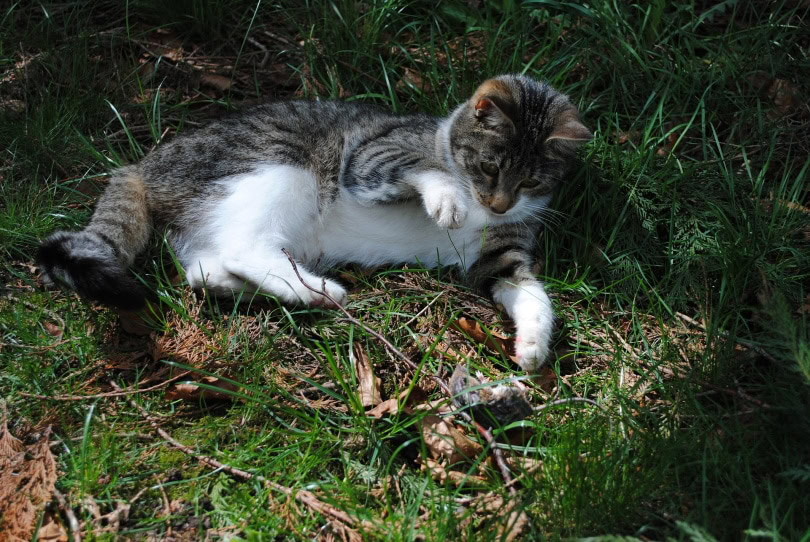
It’s all about impulse and survival. Cats are at their most active at dusk and dawn (this makes them crepuscular), and this is when they will spend their time hunting. Even though you feed your cat regularly, this doesn’t stop their hunting instincts, though they may or may not kill and eat their prey, depending on how hungry they are.
The University of Georgia conducted research using small cameras attached to the collars of 60 pet cats. These cameras found that the cats spent a great deal of time hunting and killing small mammals and lizards, but they only ate what they killed about 30% of the time. About 20% of the time, they brought their prey home (and probably left them in their owner’s shoes).
For centuries (some speculate for the past 12,000 years), cats have slowly been domesticated. They were handy for getting rid of pests, specifically mice, in grain storage, and the rest is history.
Hunting and eating mice is literally hard-wired into a cat’s biology, DNA, and ancestry. For modern pet cats, hunting can also be a source of entertainment.

Why Do Cats Bring Mice as Gifts to Their Owners?
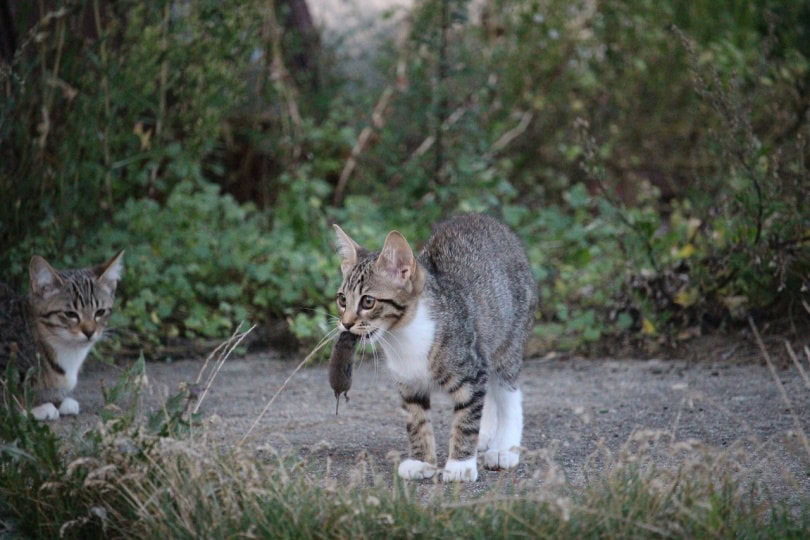
Part of the reason that cats bring their prey inside is to keep it in a safe place. But in other cases, if a female cat is doing this often, it could be that she’s acting out of instinct, playing her role of a natural provider to her young.
In the wild, this behavior would represent an important survival lesson for the kittens. She knows that there’s no chance you could have caught a mouse all on your own.
So, as awful as it is for us, it’s a flattering and loving gesture on your cat’s behalf because they are essentially telling you that you’re part of their family.
This is also a good reason that you shouldn’t ever punish your cat when they bring you a gift. Chasing, catching, and bringing you a mouse are completely natural instincts for a cat, and that is not something they should be chastened for.
Why Do Cats Play With Mice?
It might seem cruel to you when you see a cat playing with a mouse before killing it. In a study from 1979, researchers discovered that the larger the prey that the cat was playing with, the longer it stayed alive.
They concluded that cats play with their prey in order to tire them out, which makes them safer for cats in the long run. For example, they found that rats stayed alive longer than mice.
Cats approach their prey with a certain amount of caution and play with it until they feel that it’s safe enough to kill. However, they also found that the hungrier the cat was, the faster they would kill it.

Is It Safe for Cats to Eat Mice?
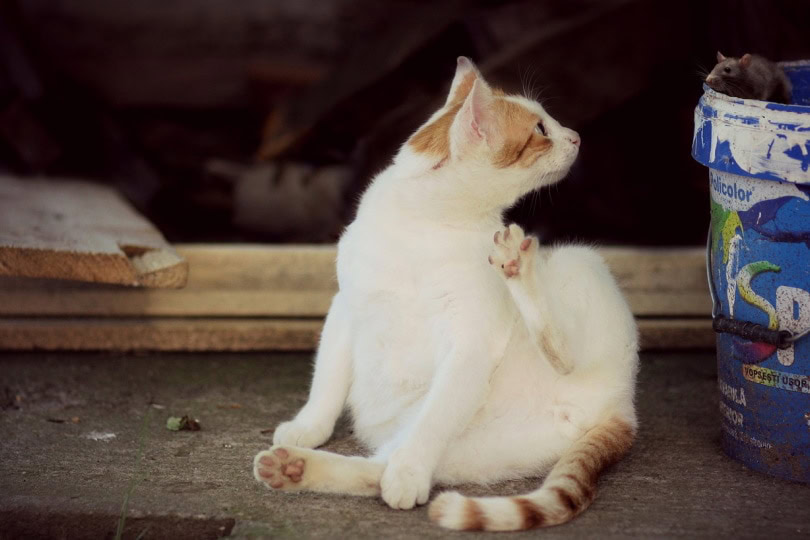
Seeing that mice are natural prey for cats, you might assume that it’s safe for your cat to eat them. But there are a few factors that you should be aware of.
If your indoor cat ate a mouse that has ingested poison, should you be concerned?
Not usually, as it is believed that your cat would have to eat several mice to be affected by the poison, but it is possible. Your best bet is to use humane or mechanical mousetraps.
Is a raw mouse okay for cats?
Some mice might transmit parasites, such as roundworms, or can cause toxoplasmosis in your cat, which can also be transmitted to your family. Bacterial infections are also a concern. In general, it’s probably okay if your cat ate a mouse, but keep an eye on your kitty for several days afterward. If you notice anything problematic, you should contact a vet. As a word of caution, trying to remove a dead mouse from your cat’s mouth can result in you getting bitten, increasing the risk of disease transmission.
Is it safe to use essential oils to prevent mice?
No, cats lack a specific enzyme in their livers to process essential oils, so they can be quite toxic for cats. They can cause illness and even death.
Are there ways to reduce my cat’s hunting?
There are a few methods that you can try to reduce your cat’s hunting behavior, but you’ll never be able to completely prevent it because it’s instinctive.
- Feed your cat regular, small meals over the course of the day. If you use puzzle feeders, they can make your cat work for their food and will provide mental stimulation. This can help reduce hunting urges.
- Be sure to feed your cat at dawn and dusk, and don’t let them outside overnight. This is when cats are most active, as is their prey.
- Create cat enrichment areas at home. Ensure that your cat has plenty of treats, toys, cat trees, and catnip. Removed a sentence
- Play with your cat. The more that you play with your cat and mimic their prey with toys, the more they can try out their hunting skills and get tired out. When using toys, try to think like a mouse or a bird, such as how they move. Let your cat pounce and catch the toy, but then let it “escape” and start all over again.
- Keep your cats indoors, take them outside only in a controlled environment like a catio or under your supervision using a harness and leash.

In Conclusion
Hunting and eating mice are normal behaviors for a cat. You might not enjoy it much but your cat certainly does. However, with hunting wild animals there is an increased risk of contracting pathogens. Keep in mind that if you have an outdoor cat, you should be diligent with their annual vet visits to keep on top of deworming and any other parasites that your cat might have picked up. The best prevention is keeping cats inside. If that is the case, it is important to spend time playing with your cat and encourage the kind of play that requires your cat’s hunting skills.
Rotate their toys, so your cat doesn’t become bored. A cat that is fed well and played with frequently will be a happy cat.
Featured Image Credit: Nicholas_Demetriades, Pixabay
